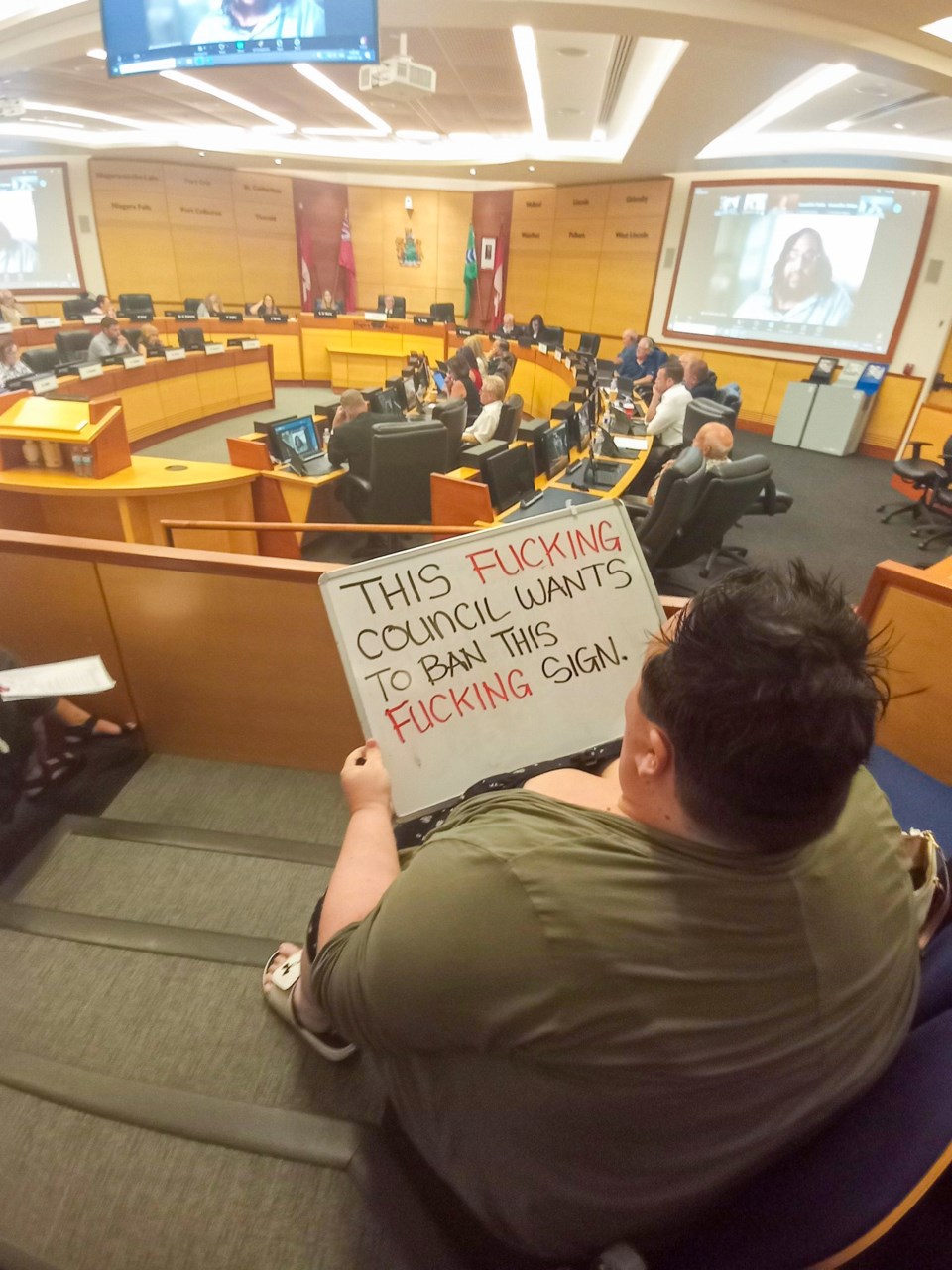An advocacy group is warning Niagara Regional Council that it could face legal challenges over a proposed procedural bylaw that includes a ban on signs, flags, props, and placards in council chambers should they decide to approve it at the end of the month.
Christine Van Geyn, litigation director for the Canadian Constitution Foundation, in Calgary, said that should the amended bylaw come into force it is “highly vulnerable” to a constitutional challenge.
The group maintains that the ban on signs and props outlined in the bylaw violated Section 1 of the Canadian Charter of Rights and Freedoms, which guarantees the right to free expression and that should the bylaw be passed, the CCF will challenge it.
“Niagara Region must show that the ban on signs, flags, props and placards is a reasonable and demonstrably justified limit to free expression through a proportionality test,” Van Geyn wrote.
That test, she said requires there be a “pressing and substantial purpose and that the means chosen to advance this purpose are: (1) rationally connected to the objective; (2) minimally impairing; and (3) produce benefits that outweigh the detriment to freedom of expression.”
The CCF wrote the letter after Regional councillors voted 27-2 last month to a series of amendments to its procedural bylaw. Among the changes is the ban on signs, placards, props, and flags in the public gallery at meetings.
But Regional Chair Jim Bradley said the Region is not alone in placing such restrictions on people coming to the council chambers for meetings and maintained that Niagara residents have plenty of ways to have their opinions heard.
“Mississauga, Guelph, Waterloo, and Toronto are just a few examples of other municipalities that have similar provisions,” he said. “And the display of signage is also prohibited in the public galleries at Queen’s Park and the House of Commons.”
Council meetings, Bradley said, are a time for business to get done.
“Council sees the maintenance of decorum while in session to be a reasonable measure and in no way makes us an outlier,” he said. “Council’s singular goal was to amend the procedural bylaw to help ensure council meetings are effective, free from distraction, and decorum is being maintained. Members were not playing a political game when voting on staff’s recommendations.”
Pelham Mayor Marvin Junkin, along with St. Catharines Regional Councillor Haley Bateman, voted against the amendments, and said he plans to vote against the amended bylaw when comes back before Regional council on Aug. 29.
“We're there, elected by the people, and I don't think it's right that we are putting more restrictions on them to come before us and talk at the same time recognizing that that decorum must be maintained,” Junkin said.
I don't think it's right that we are putting more restrictions on them to come before us and talk
He added that he has no problem with people coming into chambers with signs, provided they are not derogatory.
“I didn't think it was right that we were restricting the use of signs in the council chamber if they're not offensive at a personal level.”
Pelham Regional Councillor Diana Huson voted in favour of the bylaw change, said that she made her views on the matter clear via PelhamToday in a recent letter to the editor, and declined to offer further comment concerning the CCF letter.
In her letter, Huson noted that the provision regarding signs and props was debated several times.
“An environmental scan was conducted and confirmed that the changes are consistent with other legislative bodies,” she wrote.
The rule only applies inside the council chamber and does not stop signs and placards from being used during “instances of peaceful assembly” outside at the Region’s offices.
Council chambers, however, are a workplace.
“While in meetings, councillors are tasked with focusing on and dealing with the business of our meetings,” Huson wrote. It's not a space to bring whatever grievance you have in the world to council chambers. Delegations are welcome provided they speak directly to an item of council business.
The signs and props issue discussion came about after a whiteboard was employed by a member of the gallery was used to criticize a female member of staff. At another meeting the sign was held up on several occasions with expletives.
“It's a little distracting to focus on debate and consider policy decisions when a sign with the f-word is being held up to your face — a fact you would be unaware of by watching the council video,” Huson wrote.

Niagara-on-the-Lake Regional Councillor Andrea Kaiser said she supported the changes at the July meeting.
“I do support something that will create a positive working environment where people, whether it's staff or councillors, Regional team members or councillors can attend meetings, do their business, and be in a respectful working environment.”
However, Kaiser said she is still open to hearing more.
“I’m always open to new information,” she said.
Thorold Regional Councillor Tim Whelan did not respond to multiple requests for comment. Mayor Terry Ugulini, who also represents Thorold, was not available to speak to PelhamToday, a spokesperson for the mayor’s office said last week, stating that Ugulini was preparing for this week’s Association of Municipalities of Ontario (AMO) conference currently under way in Ottawa.
Meanwhile, Brock University political science professor emeritus David Siegel said he didn’t want to wade into the debate over constitutionality of the bylaw as he is not a lawyer.
“However, the Charter of Rights and Freedoms is prefaced with a comment about subject to reasonable restraints,” Siegel said. “In other words, no one has totally unfettered freedom of expression.”
He noted that CCF is a group that “leans strongly” toward emphasizing personal freedoms.
“It's good that they provide that emphasis, but the Charter says that there needs to be reasonable balance among rights.”
In his own view, Siegel said he does not like spectators bringing signs into meetings.
“They can obstruct the views of others attending the meeting, thus limiting those people's freedom of expression, and the signs can incite others and become objects of struggle, and someone could end up being injured.”
Siegel said municipalities need to have such bylaws in place so that meetings can be conducted in an orderly fashion.
“As far as maintaining decorum at meetings, municipalities have procedure bylaws that determine who can speak, what rules they must follow, and so forth,” Siegel said. “Those rules need to be applied fairly, but firmly to ensure that everyone's interests have a right to heard. The bylaw should also have some provision to ensure that speakers at a meeting are addressing issues that are germane to council business.”
If an appeal is launched, it would not be the first time that the CCF has clashed with the Region. The group is working with Ontario lawyer Julian Renaud, who filed for a judicial review of the Region’s declaration of a state of emergency in advance of the solar eclipse that occurred on April 8
Renaud added that the CCF agrees maintaining decorum at meetings is important to ensure meetings are efficient and removing disruptions and obstructions from meetings can be valid, it questioned whether a total ban on signs, props, placards, and flags “is rationally connected to these goals.”
Renaud said the notion that signs and props are a distraction is nonsense and that “items are typically not so distracting that council is unable to deliberate, and certainly far less distracting than the cell phones councillors are frequently seen using during meetings.”



